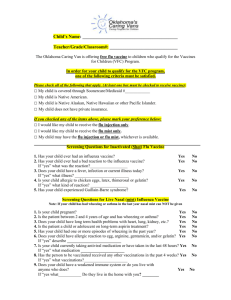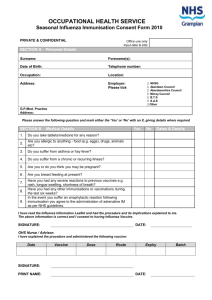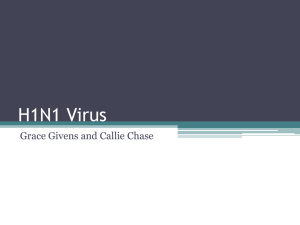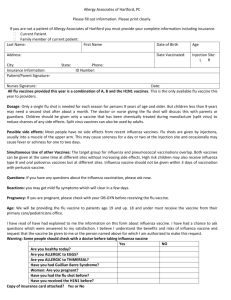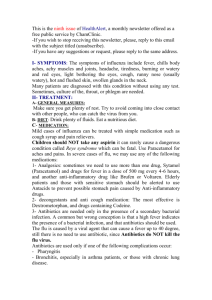Type the Title of Your Talk Here
advertisement
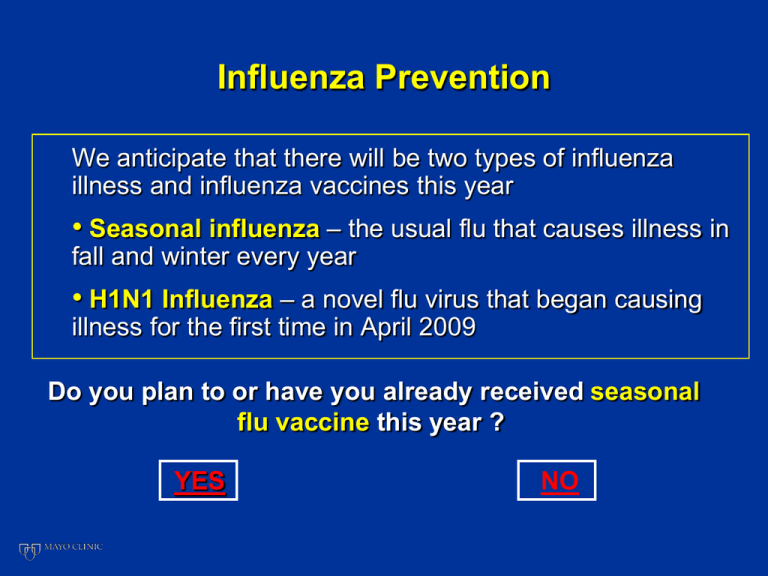
Influenza Prevention We anticipate that there will be two types of influenza illness and influenza vaccines this year • Seasonal influenza – the usual flu that causes illness in fall and winter every year • H1N1 Influenza – a novel flu virus that began causing illness for the first time in April 2009 Do you plan to or have you already received seasonal flu vaccine this year ? YES NO • The following presentation will take approximately 5 minutes to view • You will be asked to answer a question at the end of the presentation Seasonal Influenza - what it is and how it spreads • Seasonal influenza causes illness in large numbers of people each year in fall and winter • People with influenza illness usually have sudden onset of fever, body aches, tiredness, cough and sore throat. • Influenza is easily spread from person to person by coughs and sneezes or by touching surfaces where the influenza germs were left by an ill person • People with influenza can spread it to others starting 1 day before they feel sick and upto 5-7 days after You can spread influenza to others even if you don’t feel sick yourself Burden of Seasonal Influenza Every year in the US • • • • 30 million people get sick due to influenza 11 million need to see a heath care provider 200,000 people are admitted to the hospital 36,000 people die from seasonal influenza Importance of Seasonal Flu Vaccine for Healthcare workers • Because you work in health care, you are twice as likely to get influenza than the general population • If you get influenza you can spread it to your patients, family and co-workers The single best way to prevent influenza is to get the flu vaccine each year Effectiveness of Vaccine • How well the flu vaccine works varies from year to year • The vaccine works best in young, healthy adults • The flu vaccine prevents influenza illness in 70-90% of healthy people under the age of 65. This means that each year a small number of people get influenza even though they got the vaccine. However they usually have less severe illness than those who were not vaccinated • The vaccine is less effective in older people and those with health problems. Thus it is even more important that people around them (family members and healthcare workers) get the flu vaccine Flu vaccine side-effects Two types of seasonal flu vaccine will be available at Mayo Flu shot: • A killed vaccine given as an injection • Side-effects include: Soreness at the vaccine site and muscle aches Flu Mist: • A live vaccine given as a nasal spray. You cannot receive this vaccine if you are 50 years or older, have chronic health problems or if you are pregnant • Side-effects include: Cough, runny nose, headache Side-effects with both types of vaccine are mild and generally last less than 48 hours TOP REASONS why you should get the flu vaccine You are more likely to get influenza because you work in healthcare If you get influenza you can spread it to patients and others even though you may not feel sick The flu vaccine is safe and effective and free By getting the flu vaccine you protect your patients, family, coworkers and community Protect our patients, protect your family, protect yourself ! After viewing this presentation, if you still DO NOT plan to get the SEASONAL FLU vaccine, please let us know why. Pick the option that best describes your reason I don’t think I need the vaccine The flu vaccine makes me sick The flu vaccine doesn’t really work The side effects of the vaccine are worse than the flu I don’t think employee flu vaccination protects patients I am allergic to the vaccine. Consider scheduling a allergy consult to see if you can safely get the flu vaccine All answers are CONFIDENTIAL Data is being collected in order to improve our programs Your answers will not be shared with supervisors Other Influenza Prevention Measures Cover your mouth and nose while coughing or sneezing and encourage others to do the same. Display Respiratory Etiquette signs in out - patient areas Room out-patients with cough illness as soon as possible. While evaluating these patients wear a droplet mask Perform hand hygiene - use soap and water or alcohol hand rub Place hospital patients with fever and respiratory symptoms in “ Droplet Plus” isolation until influenza is ruled out, follow Door Card instructions If you think you have Influenza…. • • Do not come in to work if you have fever and cough • Call your phsyician if you have questions about when you can safely return to work • Prescription medication (antivirals) can be helpful if started within 48 hours. Talk to your primary provider, especially if you have heart or lung problems If you are diagnosed with seasonal influenza you need to stay home till your fever is gone • Remember the flu vaccine is not 100% effective. So you can still get the flu even if you have had the flu vaccine. H1N1 Influenza • H1N1 flu virus is a novel flu virus that began causing flu-like illness in April, 2009 • H1N1 illness is similar to seasonal flu – main symptoms are fever, muscle aches, cough, sore throat • The seasonal flu vaccine will not protect against H1N1 • An H1N1 vaccine will be available later this year, watch the Influenza web site for H1N1 vaccine information • H1N1 vaccination is currently recommended for: • Pregnant women • Contacts of children less than 6 months of age • Healthcare workers • People 6 months -24 years • People 25-64 years with chronic medical problems H1N1 Influenza • H1N1 flu virus is a novel flu virus that began causing flu-like illness in April of 2009 • As of August 2009, over 7000 cases and 500 deaths due to H1N1 have been reported in the US • It is likely that we will see more H1N1 cases this fall • H1N1 illness is similar to seasonal flu – main symptoms are fever, muscle aches, cough, sore throat • H1N1 most commonly affects younger people, especially those between the age of 5 and 24 years H1N1 Vaccine • The seasonal flu vaccine will not protect against H1N1 • An H1N1 vaccine will be available later this year • Groups with highest priority for H1N1 vaccination include: • • • • • Pregnant women People who care for children younger than 6 months Health care workers who have direct patient contact Children 6 months - 4 years Children 5 -18 years with chronic medical conditions • It is likely that you will need 2 doses of H1N1 vaccine separated by 3 weeks • Can I do anything else to prevent H1N1? • H1N1 is spread in the same way as seasonal influenza • Hand hygiene, respiratory etiquette and appropriate isolation prevent spread of both seasonal and H1N1 influenza • Stay home if you have fever and new cough • If you are diagnosed with H1N1 infection, we currently recommend that you stay home for 7 days from when you started feeling sick. • H1N1 information is changing rapidly. • AOEC thanks William Buchta, MD of the Mayo Clinic System for donating this set of slides. August 2009
